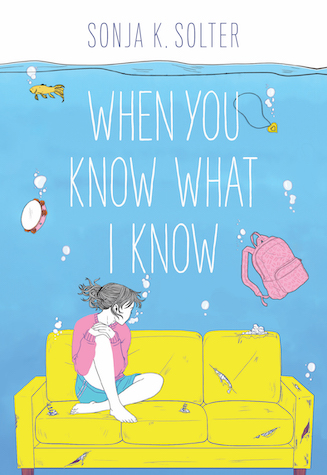[Note From Frolic: Our resident YA expert Aurora Dominguez got the opportunity to interview author Sonja K. Solter and ask her five(ish) questions. Sonja’s novel ‘When You Know What I Know‘ is out now!]
Aurora: What was you inspiration behind your most recent novel?
Sonja K. Solter: I’m a very intuitive writer, so it felt like Tori’s voice flowed through me quite suddenly, with the poem “Believe Me” emerging almost fully formed, as if this character wanted to speak and give voice to her experience. However, my writing also often has to do with the ‘big’ questions I’m wrestling with. So, in this case, I believe the story was also inspired by my experiences reading, and occasionally responding, to people on social media who were having a lot of trouble understanding the experiences and responses of survivors of various kinds of trauma.
The move towards healing in the storyline relates to my own experiences in healing from my own trauma and my inner conviction that healing, while a difficult journey, is indeed possible.
What character do you most relate to and why?
I relate to aspects of all of the characters, as they each show different phases and nuances of our relationships with and understanding of one other. I relate most strongly to Tori, particularly her experience of self-doubt in the aftermath of trauma. However, I can also identify in myself the experience of Rhea in making assumptions about other people’s experiences at times, particularly if it has to do with fears about my relationship with them or about rejection.
Why do you feel books with powerful and relatable characters are so popular and have such a voice right now?
I think powerfully written characters are the most impactful because their experience feels real to our shared humanity, even if the exact experience isn’t the same as the reader’s. It’s the grounding into the reality of the experience that makes it understandable and creates identification and empathy rather than if the reader has shared the same specifics. (Note: I believe stories outside of the realistic fiction genre can do this same thing.)
These kinds of characters have always resonated with readers. However, now a much greater diversity of voices and experiences are being published. This means that readers can gain connection to and a deeper understanding of a much greater range of the experiences that exist in the world, in addition to the foundational importance of more people feeling like they can see their own experiences represented.
Please describe the content of your latest book and what readers can expect from the read.
When You Know What I Know is a middle grade novel-in-verse about a girl’s difficult journey after being sexually abused by her uncle. It’s the story of the complex ways in which the main character’s psychological consequences interrelate with friendship, family relationships, and other aspects of life. The book does not detail the actual abuse, but it very much immerses the reader in intense emotions, with the promise of hope for healing in the end.
What’s next for you in the book world?
I write from picture books up through YA, and I’m always working on several stories at various stages of drafting and revision at any given time. So we’ll see which piece ends up being the right fit to go out into the world next!
Who is your favorite author right now and why?
My favorite author right now is N. K. Jemisin, who amazes and moves me with the scope of her themes and characterization, all within an intricate, grand, and original plot and world. I also want to mention Elizabeth Acevedo’s YA novel in verse The Poet X, which I recently read and whose stunningly conveyed truths have stayed with me ever since.













